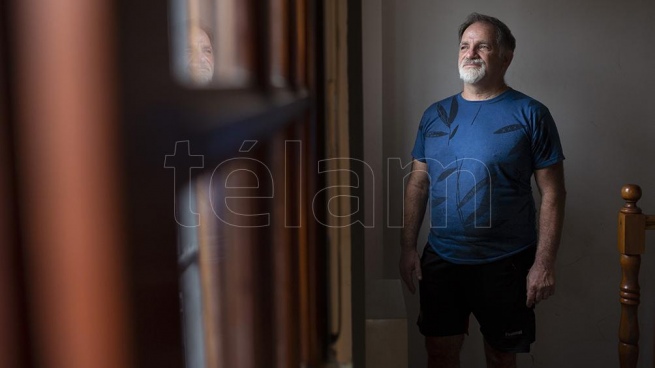Hallucinations, sleep deficits and disorientation are some of the symptoms that severe coronavirus patients suffered during their hospitalizations in intensive care caused by a phenomenon called “delirium”, which affects more than 50% of those hospitalized for Covid-19 and that it is linked to cognitive and psychological sequelae.
Defined as a acute brain dysfunctiondelirium was registered, prior to the pandemic, in patients between 75 and 80 years old, mostly, who in many cases already suffered from dementia.
However, this condition is affecting almost 55% of coronavirus patients hospitalized in Intensive Care Units (ICU), even being younger and without any previous cognitive damageaccording to a study that analyzed 2,088 patients from 14 countries, published in the medical journal The Lancet.
“I’ve never really had nightmares as painful as these that take me to the point of not wanting to sleep anymore because I knew that if I slept another one would come”Marcelo Solodujin, 63-year-old patient
In dialogue with Télam, Darío Villalba, respiratory care specialist at the Argentine Society of Intensive Therapy (SATI), explained that delirium is associated with “worse results in treatment” by implying a greater requirement for mechanical ventilation, more days of hospitalization, greater risk of mortality and “greater post-discharge sequelae” of intensive therapy.

This syndrome “is usually difficult to treat,” so it is appropriate to prevent it, although during the pandemic it was “difficult to take the necessary measures to avoid it,” said Villalba, who explained that delirium manifests itself through cognitive alterations, perception or both together.
Patients consulted by Télam, however, remember it or associate it with “sinister nightmares” who marked their passage through intensive care, where they remained hospitalized with coronavirus.
“I’ve never really had nightmares as painful as these that take me to the point of not wanting to sleep anymore because I knew if I slept another one would come,” reported Marcelo Solodujin (63), who remained hospitalized for 53 daysof which 10 were intubated at the Güemes Sanatorium in the City of Buenos Aires, in September 2020.

It is that the pandemic seems to have all the necessary ingredients for the perfect storm: long periods connected to a mechanical respirator, strong sedatives, poor sleep and the inability to move and interact especially with relatives, in addition to the unusual protective equipment that barely allows the face of the health personnel who treated them to be seen.
“I don’t want to exaggerate, but the traumas that remain must be similar to a guy coming back from war”Daniel Teper, 68-year-old patient
During his worst hospital days, Marcelo claimed to have gone through three nightmares that transported him to be the victim of a kidnapping coordinated by a sect, an experimentation project with his own body in the hands of supernatural characters and the threat to his family, pets and other loved ones.
“In all of them there was something in common and it was that I wanted to escape death. Today I think that perhaps that was what kept me alive,” Marcelo reflected and assured that “it is terrifying to see yourself in that state, losing weight and with cables hanging” .
“I don’t want to exaggerate, but the traumas that remain must be similar to a guy coming back from war,” expressed Daniel Teper (68), who spent nine days in the ICU of the Antarctica Sanatoriumin April 2021.
“The intensive care environment is not a joke, it really is very strong to be in a room with 30 people without dividing curtains, the lights on 24 hours a day, the permanent cries of pain and the staff who couldn’t cope,” said Daniel, who assured that “of the nine days that I was there I did not sleep any”.

“I saw how they left there dead, without being able to say goodbye to anyone. Knowing that the same thing can happen to you is horrible, there is no way to live that without it destroying you psychically,” he added.
The hallucinations, which came when he slept, caused him “very sad images” that still haunt him in nightmares, along with a “recurring feeling of drowning” that he did not suffer before.
A similar situation described Javier Piorno (48), who remained with respiratory assistance for 49 days after being infected with coronavirus in October 2020 and still recovering from its aftermath.
Javier is the head of the Medical Clinic at the Lucio Molas Hospitalin the city of Santa Rosa, La Pampa, and until the moment of becoming infected, he headed the Emerging Center for Respiratory Assistance (CEAR), where he was later hospitalized and in the hands of his own colleagues.
“I saw how they left there dead, without being able to say goodbye to anyone. Knowing that the same thing can happen to you is horrible, there is no way to live that without it destroying you psychically”Daniel Teper, 68-year-old patient
In addition to the nightmares he suffered during his hospitalization, in which his life was always in danger, the nurse highlighted -in particular- the memory of the sound of an alarm, which until long after his discharge it plagued him with nightmares and kept him insomniac several times a week.
“Over time I identified that it is an alarm from the hospital where I was hospitalized and where I work,” said Javier, who, having already returned to some of his tasks, added that he can “assure that now, every time I hear that alarm it drills into my head It’s a horrible feeling that I can’t explain.”
Villalba assured that these psychic consequences, known as “post-ICU syndrome” are “common” in patients discharged from these units and that, like hospital delirium, they must be treated early for “a quick recovery.”
This condition is a “public health issue,” he considered, because it can generate “the absence of a person in their work and social environments, the family burden of their care and the financial burden on the health system to which the patient belongs.”
The former patients agreed, in turn, on the importance of make visible “the psychological consequences it generates” hospital delirium and promote its treatment with mental health professionals.








